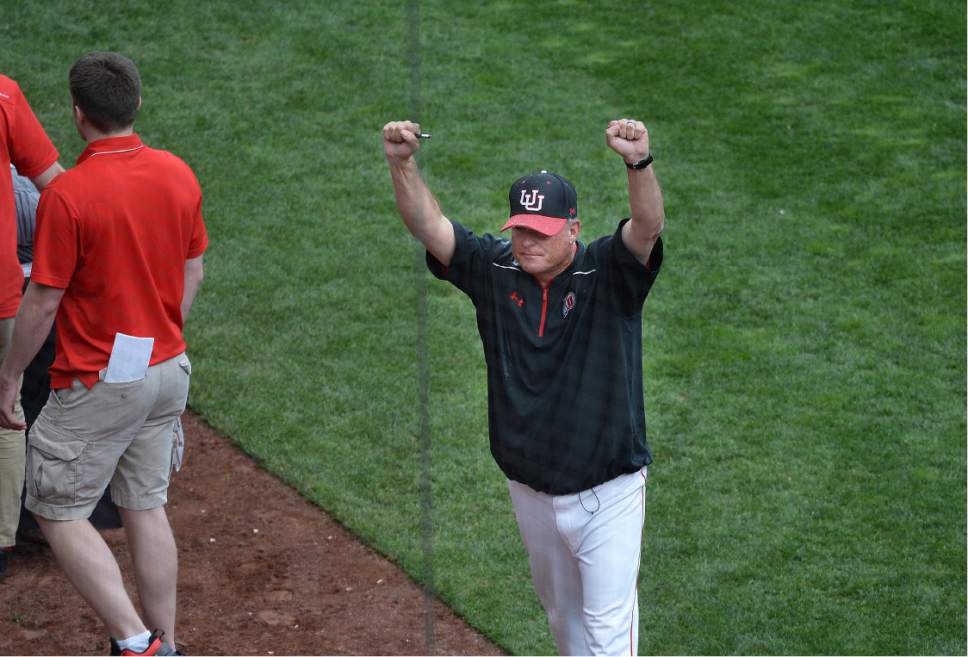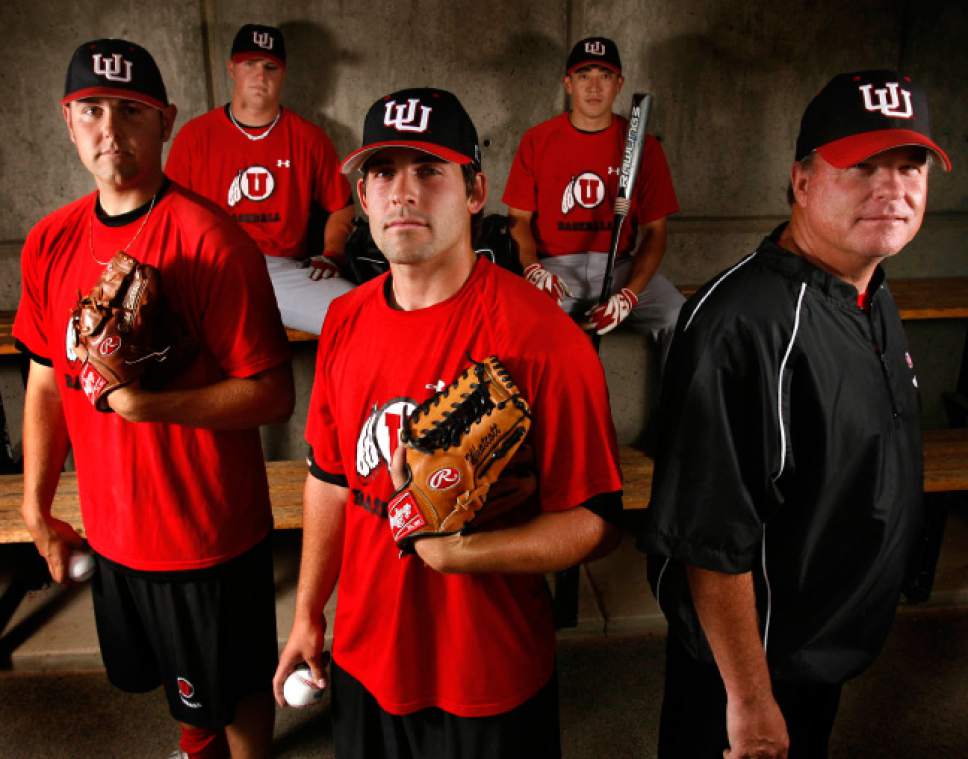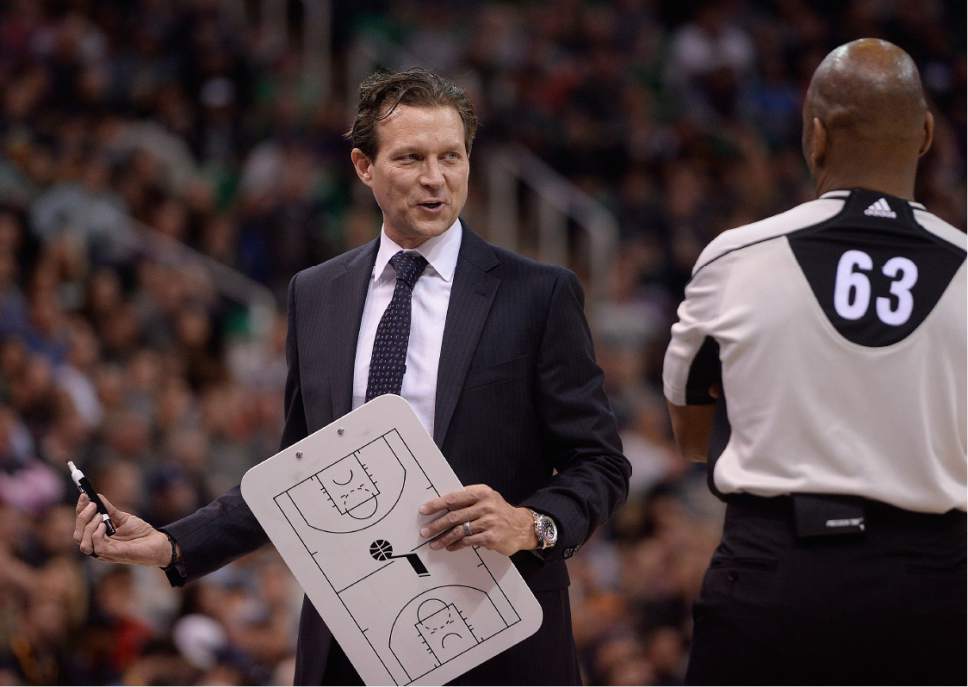This is an archived article that was published on sltrib.com in 2016, and information in the article may be outdated. It is provided only for personal research purposes and may not be reprinted.
Who did the best job of coaching among college and professional ranks in the state of Utah in 2016? Factoring in the rather subjective varying degrees of difficulty and assorted circumstances in each coach's pursuit, here's the Sweet 16 ranking, which actually includes 19 coaches because of two ties and a co-head coach situation, in reverse order:
16. Dave Rose, BYU men's basketball • Being listed first here is kind of a booby prize — better than not getting mentioned at all, but … but. Cougar basketball won 26 games — but Rose's team fell into the predictable limitations of a group going nowhere special. The Cougars failed to win the WCC tournament, failed to qualify for the NCAA Tournament, and made a run in the NIT.
15. Beth Launiere, Utah women's volleyball • Utah posted a 20-12 mark, qualifying for the NCAA Tournament, where it lost in the first round to UNLV.
14. Rich Manning, Utah women's soccer • Manning reasonably could have been higher. His Utes made headway with a 13-4-5 season that finished strong — with wins over No. 9 UCLA, and, in the NCAA Tournament, over Texas Tech and No. 10 Florida State.
13. Jay Hill, Weber State football • Hill led the Weebs to a 6-2 mark in the Big Sky, a slot in the FCS playoff, a loss in the first round, and a 7-5 overall record.
12. Kevin Sweeney, Utah skiing • The Utes finished third at the NCAA ski championships, behind Denver and Colorado and just ahead of Montana State and Dartmouth.
11. (Tie) Randy Rahe, Weber State men's basketball/Heather Olmstead, BYU women's volleyball • Weber State's 2015-16 run was a memorable one for the Wildcats. Rahe's team went 26-9, won the Big Sky regular-season title with a 15-3 record, the conference tournament, and qualified for the NCAA Tournament, where it lost in the first round to Xavier. Olmstead's Cougars finished their season 29-4, losing in the NCAA Regional semifinals to No. 4 Texas.
10. Megan Marsden/Tom Farden, Utah gymnastics • The Utes finished outside the final six at the NCAA championships, but considering Marsden and Farden lost much of the team's frontline senior talent from the previous season, their results, on the whole, were good — until difficulties at the NCAAs.
9. (Tie) Kyle Whittingham, Utah football, and Ed Eyestone, BYU men's cross country • In what might have been a historic season for the Utes, having positioned themselves favorably to win the Pac-12's South Division and battle for the league title and a Rose Bowl berth, the bottom dropped out in November when Utah lost three of four games. Whittingham deserves credit for the early success and the blame for the late swoon. Utah faces 6-6 Indiana in the Foster Farms Bowl on Wednesday, but win or lose, the Utes will feel the sting of 2016 for seasons to come. Eyestone led the BYU men to a WCC title and a seventh-place finish in the NCAA championships.
8. Jeff Judkins, BYU women's basketball • Judkins' team was 26-7 overall, 16-2 in the West Coast Conference, sweet records that were tarnished at the end when the Cougars lost to sixth-seeded San Francisco in the WCC tournament and to 10th-seeded Missouri in the NCAA Tournament. 7. Kalani Sitake, BYU football • Sitake breathed new life into Cougar football in his first season, despite starting 1-3. From that juncture, while not always playing the toughest competition, BYU finished 8-1, including a bowl win over Wyoming. Considering he was a rookie head coach, with rookies Ty Detmer at offensive coordinator and Ilaisa Tuiaki at defensive coordinator, the trio's acclimation to those roles, while imperfect, was notable.
6. Larry Krystkowiak, Utah men's basketball • The season didn't end the way Krystkowiak had hoped when the Utes were rocked by Gonzaga in the round of 32 of the NCAA Tournament. But Utah, led by Jakob Poeltl, earned a No. 3 seed for the tournament and ended its season at 27-9.
5. Jennifer Rockwood, BYU women's soccer • Rockwood's team was ranked fourth in the nation entering the NCAAs, having won the WCC and dominated many opponents. The Cougars made it three rounds deep in the tournament, eventually falling to third-ranked South Carolina, 1-0, on the Gamecocks' home field. BYU finished 18-3-1.
4. Quin Snyder, Jazz • Snyder was more than bitten by bad luck in 2016, he might have been devoured by it. Through the 2015-16 season, the Jazz suffered almost every kind of injury possible — and still nearly made the playoffs. The team has suffered the same misfortune thus far in 2016-17, but Snyder has kept the Jazz afloat in the rough Western Conference playoff race — despite losing a fistful of his best players. Lord knows how good this team will be when it gets all of its players back.
3. Bill Kinneberg, Utah baseball • No University of Utah men's team had won a Pac-12 championship in any sport since the Utes entered the conference in 2011 — until Kenneberg's baseball team did it in 2016. Utah did not have any kind of stellar overall record, but it went 19-11 in league, winning the title while Kenneberg was named Pac-12 coach of the year.
2. Shawn Olmstead, BYU men's volleyball • Olmstead took over the men's team in 2016, after guiding the women's program for four years, and in his first crack led the Cougars to the NCAA's national championship match. BYU was ranked No. 1 heading into the tournament, having dominated the Mountain Pacific Sports Federation, beating UCLA three different times to win the league title.
1 . Todd Phillips, Salt Lake Community College men's basketball • The Bruins won the NJCAA national championship, stacking up a record of 31-8, winning five games in the tournament against ranked teams — Northeast Mississippi, Odessa, Southwest Tennessee, Gillette, and Hutchinson.
GORDON MONSON hosts "The Big Show" with Spence Checketts weekdays from 3-7 p.m. on the Zone Sports Network, 97.5 FM and 1280 AM. Twitter: @GordonMonson.







